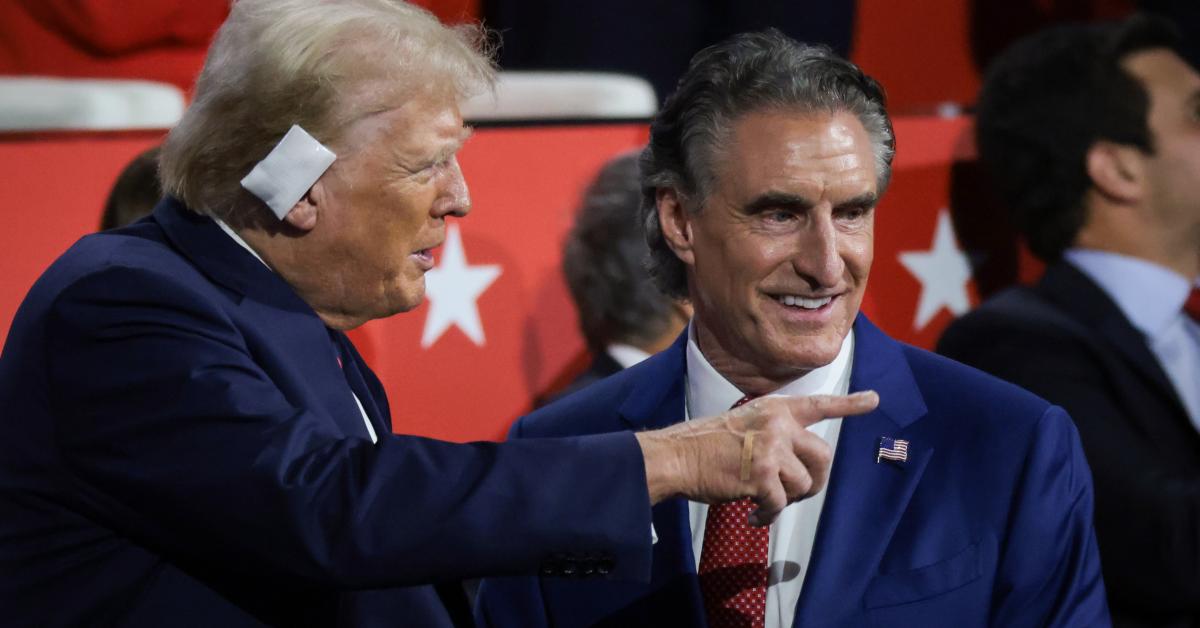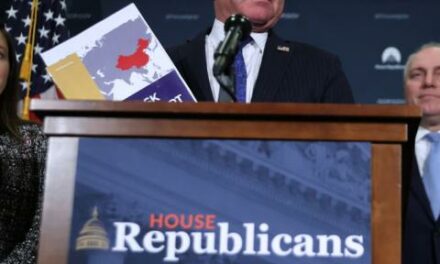We support our Publishers and Content Creators. You can view this story on their website by CLICKING HERE.

Signaling that his “drill, baby drill” chant wasn’t just a campaign slogan, Trump Friday officially nominated North Dakota Gov. Doug Burgum to head the Department of the Interior. Additionally, Burgum will chair the newly formed National Energy Council, making him nation’s de-facto “energy czar.”
If the Senate confirms him for Interior Secretary, Burgum will oversee 480 million acres of public lands, 700 million acres of minerals below the ground, and 1,7 billion acres of offshore area off America’s coasts.
Tim Stewart, president of the U.S. Oil and Gas Association, said Burgum’s experience as governor will serve him well in the position.
“Governors often make the best cabinet secretaries. The size of the departments require significant executive management experience. The Department of the Interior has a budget of $18 billion and 70,000 employees over 2,400 locations across the country. It is the nation’s largest landlord. In other words, running the DOI is like running a state government,” Stewart said.
Net zero proponent
North Dakota is the third largest producer of oil in the United States behind New Mexico and Texas. In 2023, 432.7 million barrels of oil. With only about 4% of its land in federal hands, much of North Dakota’s production occurs on state and private land.
Having led a state gushing millions of barrels of oil every day, environmentalists criticized Trump’s choice. The Sierra Club called Burgum a “climate skeptic,” saying he advocated for rolling back environmental regulations. The Center for Biological Diversity said he’ll be a ““disastrous secretary of the interior who’ll sacrifice our public land.”
While Burgum hasn’t been openly hostile to fossil fuels as environmentalists would like, as governor of North Dakota, he outlined plans to make the state carbon neutral by 2030. He’s also been supportive of carbon capture initiatives, arguing they have economic benefits.
In 2021, he spoke favorably about ESG. “To grow and diversify North Dakota’s economy, we must be able to attract capital to our state. And currently, so-called ESG principles – short for Environment, Social and Governance – are being used on Wall Street to both guide and restrict investment decisions,” he told Future Farmer.
However, Burgum has stated that the Biden-Harris administration’s policies are much more destructive than climate change. “It’s not climate change we need to worry about. It’s about the Biden climate policies that are actually the existential threat to America’s future,” he said during the Republican primary presidential debate.
Cowboys and Indians
About 25% of crude oil production happens on federal lands. Where Burgum could have the most influence on oil and gas production is in states like Wyoming. Nearly half of the state’s land is under federal control, meaning most oil and gas production in Wyoming is under the auspices of the Bureau of Land Management.
Under the Biden administration, the state has seen a precipitous drop in the number of acres the BLM offers for oil and gas leases. The latest auction in September, Cowboy State Daily reported, offered just 159 acres. That netted $27,000. In June 2022, the federal government offered 100,000 acres for leases.
The Biden administration had similar impacts on Alaska. The federal government controls 61% of the state’s land, which is 223 million acres.
Among dozens of actions directly impacting oil, gas and mineral development in Alaska, President Joe Biden announced in September 2023 that it was moving to limit future oil and gas leasing, as well as other industrial development, on 13 million acres of the National Petroleum Reserve – Alaska. The rule, which was finalized in April, also established an outright prohibition on new leasing on 10.6 million acres — 40% of the reserve.
For Alaska Native communities on the state’s North Slope, the rules were limiting a huge source of revenue that has allowed them to develop modern amenities. Nagruk Harcharek, president of the Voice of the Arctic Iñupiat, told Just the News after the rules were finalized that services like sewer systems, schools and health clinics arrived on the North Slope only within the last generation.
The Voice of the Arctic Iñupiat represents 24 members in eight Alaskan Native communities spread out across 95,000 square miles of northern Alaska. Its members include local governments, Alaska Native Corporations, federally recognized tribes and tribal nonprofits. For years, the organization requested an audience with the Interior Secretary under Biden, Deb Haaland. These requests were declined or ignored until last summer when Haaland finally met with members of the Voice.
In a statement to Just the News Friday, Harcharek said he’s hopeful that Burgum will be more receptive to the Voice of the Arctic Iñupiat’s concerns.
“We congratulate Gov. Burgum and encourage him to prioritize early and often meaningful engagement and consultation with Indigenous elected leaders when making decisions affecting their lands and communities. If Gov. Burgum is formally nominated and confirmed by the Senate, we look forward to working with him and educating other appointed officials in the incoming Trump-Vance administration, as well as new and returning congressional representatives, to advance North Slope Iñupiat self-determination in our ancestral homelands – as we have done with elected leaders on both sides of the aisle for a decade,” Harcharek said.
Sharp contrast
Daniel Turner, executive director of Power the Future, an energy advocacy and education nonprofit, told Just the News that Haaland’s decisions weren’t limited to Alaska and negatively impacted the oil and gas industry across the U.S.
“Deb Haaland was one of the worst DEI [diversity, equity and inclusion] hires of the Biden-Harris administration, and she can’t become unemployed fast enough. Under Haaland, the Interior Department leased the fewest acres of land since Truman and openly bragged about destroying offshore oil leases,” Turner said.
In a statement on his social media platform Truth Social, Trump said the National Energy Council that Burgum will chair will “consist of all departments and agencies involved in the permitting, production, generation, distribution, regulation, [and] transportation of all forms of American energy. This council will oversee the path to U.S. energy dominance by cutting red tape, enhancing private sector investments across all sectors of the economy.”
Turner said Burgum’s goals will be “in sharp contrast” to those of Haaland. “Burgum is a leader of a rural, energy rich state who always puts common sense first. While Haaland ignored the needs of Western states, Burgum understands the challenges and opportunities of the West where the federal government is a major landholder. We fully support President Trump’s nomination of Governor Burgum and only regret that he can’t start immediately,” Turner said.
“Shares our lifestyle”
Outdoor recreation enthusiasts also expressed approval of Trump’s choice. Prior to Trump announcing Burgum for the positions, Gabriella Hoffman, director Center for Energy & Conservation Director at the Independent Women’s Forum and self-described avid outdoorswoman, said Thursday in a post on X that Trump’s pick for Interior secretary should support hunters and anglers.
After the announcement, Hoffman praised Burgum. He “is an avid bowhunter. Very important to have an Interior secretary who shares our lifestyle, since hunters, gun owners, and anglers fund 60%-80% of conservation funding in the U.S.,” Hoffman said in a post on X, which included a photo of Burgum with a buck he’d successfully hunted with a bow.
Burgum still must succeed in the confirmation hearings, but with a Republican-controlled Senate, he may not face much opposition. For the oil and gas industry and its supporters, Burgum’s leadership, they expect, will take the Interior Department in much better direction.
“Governor Burgum knows how to run a lean, efficient operation, and he knows how to hold public employees accountable. He’s smart, successful and has a keen political sense. He knows our industry well and he is a great pick,” Stewart, with the U.S. Oil and Gas Association, said.

 Conservative
Conservative  Search
Search Trending
Trending Current News
Current News 




